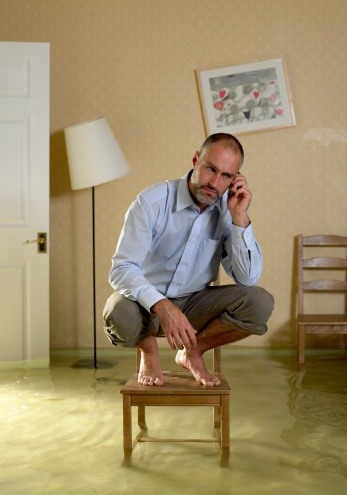 Forrest Gump famously said something to the effect of “stuff happens.” If you have been in residential property management for any length of time, you know this is true. From bursting water lines to falling trees, handling emergency situations just comes with the territory. So, what do you do when this “stuff” happens? How should you handle it? Unfortunately, there’s no instruction manual for handling every possible emergency scenario, but here are a few guide posts to help you navigate these difficult situations.
Forrest Gump famously said something to the effect of “stuff happens.” If you have been in residential property management for any length of time, you know this is true. From bursting water lines to falling trees, handling emergency situations just comes with the territory. So, what do you do when this “stuff” happens? How should you handle it? Unfortunately, there’s no instruction manual for handling every possible emergency scenario, but here are a few guide posts to help you navigate these difficult situations.
Triage the situation
Sometimes you’ll get residents that will call you for everything. Your number is on speed dial on their phone, and they think you’re the end-all solution to all their problems. The problem with this is sometimes there are emergency situations that are completely out of your scope of work. The neighbors are getting in a domestic dispute? Call the police. There’s a small grease fire in their kitchen? Call the fire department. There’s a stray dog on the premises? Call animal control. There’s a zombie outbreak, run! (Just kidding). The point is, some emergencies are beyond your capabilities to handle and they need to contact the emergency services the city provides.
Other times the situation is not an emergency. You saw a mouse in your unit? We’ll get a pest control person over thee in the morning. The smoke alarm is chirping and you can’t figure it out? We’ll send a handy man out first thing tomorrow. Granted, you may have special relationships with tenants or special situations where you feel late night phone calls like this warrant you to drive down there in the middle of the night. However, if you make yourself too available too often for small things like this, eventually you’ll burn yourself out.
First triage the situation. Is it a real emergency? Is it in my scope of responsibility? Questions like these will help you know how to respond.
Respond quickly
No matter what the situation or the time it occurs, residents should have a response from you either immediately or at least within 2 hours. For us at Hignell Property Management there’s always a human being on call locally.
Some management companies have answering services designed to screen the emergency calls, or worse yet, let it go to voicemail. If you want to have long-lasting tenants, you must be responsive. Even if you can’t do anything about it now, just letting the tenant know you got their message and are working on a solution will go a long way.
An ounce of prevention
Many emergency calls could be prevented or limited in their affects, if the tenants had a small amount of training upon moving in. For instance, many times we show tenants where the main water shut off valve is on the house they’re renting. This is important because if a water pipe bursts while the tenant is home, they can prevent costly damage by immediately shutting off the water to the home.
It can also be helpful to show how to replace batteries in the thermostat, change air filters, know how the breaker box works, and where GFI’s are located. Surprisingly, not everyone thinks about these things or knows how they work. A quick 5-minute training upon moving in can help save an exponential amount of time managing an emergency call in the middle of the night.
Respond with empathy
There’s a big difference between sympathy and empathy. If someone falls into a hole, sympathy says “Aw, that’s too bad you’re in a hole.” Empathy emotionally climbs down into the hole and says, “I’m with you, I feel you.” It’s often subtle, and it can be hard to explain, but responding with empathy makes a huge difference. The key is relating emotionally to what they’re going through.
Have you ever been locked out of your house at 2 am? Have you ever had a pipe burst in your house? Remember what it felt like and for a moment on the phone feel their pain and respond from that place. That’s empathy, and when people feel that from you in their situation not only will it calm them down, but they’ll see you as an amazing manager that truly cares.
Let’s be honest, when someone calls us in the middle of the night with a problem, we can naturally respond with annoyance and sometimes an underlying anger. Residential property managers who can override their natural negative emotions in these situations set themselves up to win loyal appreciative tenants, and besides, it’s just the right thing to do.
Learn from experience
In any emergency, one of the best things you can have is preparation from past experience. This is something that you can proactively go after when there isn’t a current emergency. The Boy Scout’s motto is Be Prepared.
At Hignell Property Management we have a large office with multiple residential property managers. Every week we share our on-call war stories with the team so that we can learn from others how they handled that situation and what they learned.
Over time we’ve heard the whole gamut of on-call emergency stories. From humorous to serious we walk away from those conversations better equipped to handle whatever emergencies get thrown our way.
No matter how big your operation is you can learn from other residential property managers by proactively asking questions and intentionally having conversations. Hignell Property Management helped start a multi county non-profit called North Valley Property Owners Association partly because of this reason. High tide makes all the boats rise. By joining organizations like the NVPOA you’ll learn not only how to manage better, but your entire city will be better managed through the shared experiences of multiple property managers.
Obviously, we can’t share exactly how to handle every unique situation, but if you follow some of these basic guide posts you’ll be better equipped to shine under the pressure of an emergency.
If you have any additional questions or would like to speak about property management services, please don’t hesitate to contact us at Hignell Property Management.










